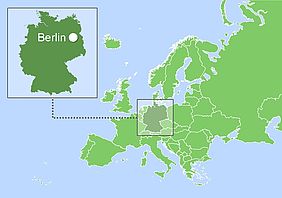Bloomberg L.P. is a software, data and media company with its headquarters in New York. It offers financial software tools and enterprise applications such as an analytics and equity trading platform, data services and news to financial companies and organizations through the Bloomberg Terminal. The company annually releases a ranking of the most innovative countries, which can be found on the company homepage.
The ranking uses 7 equally-weighted metrics: R&D intensity, Manufacturing value-added, Productivity, High-tech density, Tertiary efficiency, Researcher concentration, and Patent activity. From over 200 economies ranked 105 had data available for at least 6 categories. The metrics were rescaled for those countries for which some data points could not be acquired.
Germany gained first place in the 2020 Bloomberg Innovation Index, dethroning six-year title holder South Korea. It received three top-five rankings in value-added manufacturing, high-tech density, and patent activity. South Korea, meanwhile, achieved poorer results, partly due to a relative decline in productivity, falling to #29 from last year’s #18 ranking in that category. Singapore’s leap into the third-place ranking returns it to the position it was at two years ago.
Nonetheless, there are several reasons why Germany should not rest on its laurels. Its services innovation is rather poor and about a third of research and development spending is in the auto industry.
South Korea’s narrow loss is hardly reason to doubt its innovative prowess. R&D spending is high and of greatest importance to South Korean companies, with tech-oriented heavyweights like Samsung Electronics Co., LG Electronics Inc., and Hyundai Motor Co. leading the economy.
Singapore’s rise to third place, from sixth last year, was mainly due to an increase in productivity and value-added manufacturing, while it retains a best-in-world ranking for tertiary-education efficiency.
The top advanced economies, meanwhile, did not perform so well in the rankings. The U.S., which was No. 1 when the Bloomberg index made its debut in 2013, dropped one spot from last year to No. 9. Consumer electronics powerhouse, Japan, no longer made the top 10 list, dipping to 12th place after ranking ninth last year.
The world’s second-biggest economy, China, climbed higher by one spot to #15. It held onto its second-place ranking on patent activity, and joined the top five for tertiary efficiency. This might be an indicator that China is preparing for a prolonged trade war by means of getting up the value chain of manufacturing.
The big winners among the ranked economies were led by Slovenia, which improved 10 spots to #21 due to its increased patent activity. Slovenia is the highest-ranked former socialist state – the next being the Czech Republic at 24. Slovenia is also the only member of the former Yugoslavia to appear in the top 60. Chile climbed seven spots to #51, improving in tertiary efficiency.
The biggest loser in this year’s index was New Zealand, which dropped five spots to #29 due to a slide in its value-added manufacturing performance.
Four economies joined the Innovation Index for the first time: Algeria with a strong debut at #49, along with Egypt, Kazakhstan and Macao.
Many European countries occupy spots in the top 20. Also, several Asian nations have joined the list: South Korea, Singapore, Japan and China. North America and the Middle-East have secured spots among the top 10.
